Headlines
Tinubu Vision for Africa: Highlights from Ghana Meeting

President Tinubu shares his vision for Africa’s future, focusing on economic cooperation and peace, in his address to leaders in Ghana.
President Bola Tinubu spoke to African leaders in Accra, Ghana on Sunday about the present status of the Economic Community of West African States (ECOWAS), highlighting both its achievements and persistent difficulties.
During the Sixth Mid-Year Coordination Meeting of the African Union, Tinubu presented a report on ECOWAS’ advancements in the past year. As chairperson of the ECOWAS Authority of Heads of State and Government, he emphasized activation of a Standby Force to combat terrorism and ongoing endeavors for securing supplementary funding.
Ajuri Ngelale, the President’s Special Adviser on Media and Publicity, stated that Tinubu has reported ECOWAS’ active support to member states in enhancing electoral processes and governance. The statement highlights the deployment of Election Observation Missions by ECOWAS to Senegal and Togo where peaceful, transparent, and fair elections were conducted
Read Also: Obidigbo to Tinubu: Restrain Onanuga or Risk Nigeria’s Destruction
In addition to that, Tinubu highlighted how ECOWAS is dedicated to aiding Sierra Leone with the implementation of the National Unity Agreement. He also disclosed that there are ongoing revisions being made to the ECOWAS 2001 Supplementary Protocol on Democracy and Good Governance.
Tinubu emphasized various endeavors related to economic integration, such as the unification of free trade areas, customs union and shared markets. He pointed out that six member countries have authorized the WTO Fisheries Subsidies Agreement while thirteen ratified AFCFTA agreement. In addition to this, ECOWAS System for Management of Goods in Transit (SIGMAT) has commenced its operations across twelve members states now.
Tinubu revealed that ECOWAS has provided $9 million to support refugees, internally displaced individuals, and asylum seekers as part of their humanitarian efforts. Moreover, member states at the forefront in fighting terrorism have received $4 million through the ECOWAS Counter Terrorism Humanitarian Response program.
The education sector has acknowledged the establishment of both the West African Network of National Academies of Sciences and the African Forum for Research and Innovation. Additionally, ECOWAS’s regional Academic Mobility Scheme is still improving youth abilities while also unifying educational systems.
ECOWAS provides assistance to women who are affected by obstetric fistula and fosters female empowerment in the field of agribusiness, while promoting gender equality within education and sustainable environmental practices. With regards to energy and agriculture, Tinubu highlighted progress made towards electrification initiatives as well as aid extended towards solar small-to-medium-sized enterprises (SMEs), along with major grants and loans anticipated to enhance access to sustainable sources of power.
During the discussion, Tinubu brought up ECOWAS’s commitment to environmental protection by backing global negotiations on ecological issues and the Paris Agreement. Additionally, she mentioned the establishment of a Regional Fund for Agriculture and Food (RFAF) aimed at enhancing food security in West Africa. Furthermore, attention was drawn towards initiatives geared towards improving pastoralism practices as well as veterinary medicine within this region.
Regarding governance, Tinubu brought up the recent activities of the ECOWAS Community Court of Justice and also acknowledged Maimunatu Ibrahim as Togo’s first female President of the ECOWAS Parliament.
Tinubu recognized various challenges, including member states’ exit threats, geopolitical tensions, terrorism, food scarcity, climate change and false information despite the accomplishments. He restated ECOWAS’s resolve to hold discussions with Burkina Faso Mali and Niger while unveiling a proposal for an exceptional Summit on the future of the community.
Tinubu held discussions with Djibouti’s President Ismail Omar Guelleh during the AU meeting about Nigeria’s leadership role and collaboration on development issues. The Mid-Year Coordination Meeting, which was created in 2017, acts as an essential forum for harmonizing the efforts of both the AU and Regional Economic Communities; this year places a particular emphasis on education.
